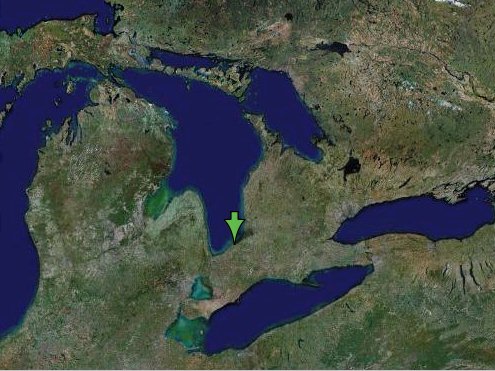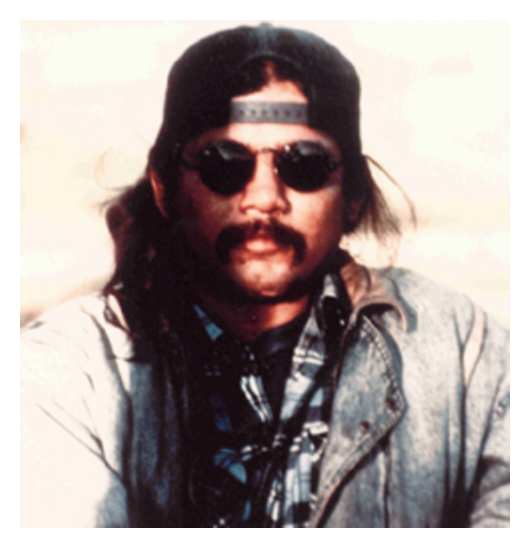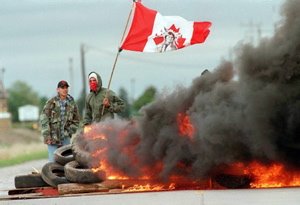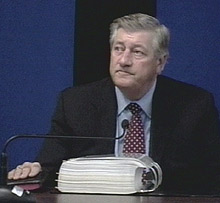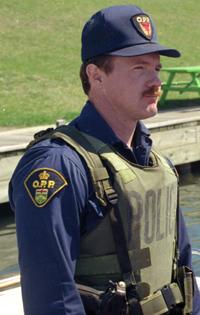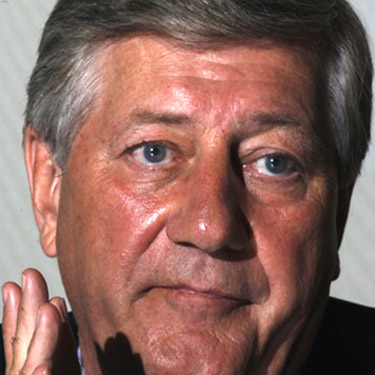| Ipperwash Returned to Native Hands
The Canada eZine - First Nations
By Suzanne MacNevin - December 2007. The Ontario government has agreed to hand over a Native land where a native protester was murdered by police 12 years ago to the Indian band that has claimed the land for decades. But Minister of Aboriginal Affairs Michael Bryant said that Ipperwash Provincial Park will only be handed over to the Chippewas of Kettle and Stony Point after an undefined period of "co-management" by the band, the provincial government and non-native residents of the area. "Today is a very good day ... it's a moment of really historic action," Bryant told a news conference Thursday. "Today I'm announcing the transfer of Ipperwash Provincial Park lands back to the Chippewas of Kettle and Stony Point." Bryant would not say what the terms of the co-management arrangement would be, how the land will be used during that period and how long it will be until the title for the tiny 109-acre park is formally handed over to the Chippewa band. Chief Tom Bressett said he was pleased that the long-standing claim to the park land is finally moving toward resolution and said he is looking forward to the co-management deal. "I'm glad the war is finally over and we're moving into a better future," he said. "We are neighbours. We've co-existed on this land for a long time."
Anthony O'Brien "Dudley" George was taking part in a native occupation of the park when he was murdered by police sniper Kenneth Deane on September 6th 1995, during a provincial police raid. Sergeant Kenneth Deane was convicted two years later of criminal negligence causing death after a court ruled he did not have a "reasonable belief" George was armed. Sam George, brother of the slain protester, said the plan to return the land is a tribute to his brother's memory. "It's been a long and hard journey to get to this point, but I feel that we are now getting someplace," he said. "It shows that we can be friends ... it shows that, it's like a game of hockey: we can all play on the same forward line together." But without his brother's death, George said that a resolution of the 60-year-old claim might have taken decades longer. "Unfortunately, he paid an awful price," he said. "He gave his life for the burial grounds, for the people of our communities. With that, I think his death did speed up things quite rapidly." An inquiry into the shooting death made dozens of recommendations, that the provincial government says it will use as a "road map" to improve relations between Ontario's Indian and Metis communities and non-natives in the province. As part of that process, Byant also announced the province is forming a committee with native and Metis representatives to decide how to act on the recommendations set out in the inquiry's final report, issued this spring. Ownership of Camp Ipperwash (the abandoned army base adjoining the park which is also claimed by the band) remains in limbo however. The federal government promised to return the land after expropriating it during the Second World War, but it was never returned to the Chippewa. Sidney Linden, the former Ontario justice who headed up the Ipperwash inquiry, said the army base "is obviously part of the problem" and Ontario will not be able to resolve its simmering native land disputes without Ottawa's involvement. Federal Minister of Indian and Northern Affairs Chuck Strahl lauded the provincial initiative in Ipperwash but stopped short of promising similar action on Camp Ipperwash.
Timeline of EventsThis story begins with a little known strip of Native Canadian land known as Ipperwash. In 1942, during World War II, the Government of Canada wanted reserve land from the Stoney Point Band for military training and offered to buy it for $15 per acre, and a promise to return the land after the war ended. The Natives rejected the offer, and in response, the federal government appropriated the lands from the Stoney Point Reserve under the War Measures Act and established Military Camp Ipperwash. The First Nations claim that the grounds contain a burial site and must be returned to the Natives. In 1993 Camp Ipperwash was still being used as cadet summer training centre for the Royal Canadian Army Cadets. Cadet training was moved to CFB Borden the same year due to Native protests. On Monday, September 4th 1995, a group of roughly 35 Natives started a protest in Ipperwash Provincial Park to draw attention to the decades-old land claims. The occupation came as no surprise to local police, as they had been threatening to occupy the park since the previous May. The OPP created a contingency plan named "Project Maple" which stressed a peaceful resolution with the Natives, and called for a team of two negotiators to be on call around the clock. Everything was going smoothly until politicians decided to get involved. On Tuesday, September 5th 1995 Premier Mike Harris and several government officials had a meeting in Toronto to discuss the Ipperwash protest. The meeting notes conclude that "The province will take steps to remove the occupiers as soon as possible." On Wednesday, September 6th 1995 a group of approximately 6 Natives began arming themselves with bats and sticks. One Native threw a rock at a car belonging to a fellow Native who had objected to the occupation.
Premier Mike Harris ordered the OPP to deploy the Crowd Management Unit (CMU is basically a riot squad) and the Tactical Response Unit (a Canadian equivalent for a SWAT team) and ordered them to "do whatever is necessary" to force the Native occupiers back into the Park. The CMU was armed with steel batons, shields and helmets. The Tactical Response Unit was armed with assault rifles and sniper rifles, indicating they were prepared for a war. On Wednesday evening, police riot squads marched down to the Sandy Parking Lot to confront the Natives. There was no attempt to negotiate peacefully. As the CMU advanced, the Natives initially retreated back and the CMU responded by retreating back. Native protester Cecil Bernard George approached the police peacefully in hopes of talking to them. Instead Cecil Bernard was taken down and surrounded by police, beaten and arrested. Native occupiers attempted to rescue Cecil Bernard George from the assault and the unprovoked police brutality. This resulted in a riot scene. A car and a school bus driven by Natives started coming out of the park to assist the Native occupiers. The OPP TRU sniper team opened fire on the vehicles resulting in the wounding of two Native protesters and the death of Dudley George. Officers later claimed there was gunfire from the vehicles but no weapons were ever found. The First Nations occupiers continue to insist there were no weapons in the Park that night, because they had rightfully chosen to ban weapons and to stage a purely peaceful protest.
Among the police shooting was Acting Sergeant Kenneth "Tex" Deane, who was a member of the TRU sniper squad. Deane's nickname "Tex" was given to him by fellow officers due his long history of being trigger-happy. Near the park entrance Deane fired three shots at Dudley George, who was approximately fifteen feet away and thus in point blank range. Deane later claimed he had mistaken the long branch which George was carrying for a rifle despite being so close that there could be no mistaking a branch for a gun. The shot's injured Dudley and he could have survived had he been sent to hospital soon after being shot. Dudley George's sister and brother attempted to bring him to the local hospital for treatment but were arrested and delayed by the OPP for over an hour. George was declared dead at 12:20 a.m. on September 7th 1995 at nearby Strathroy Middlesex General Hospital, in Strathroy, Ontario. Acting Sergeant Ken Deane was later convicted of criminal negligence causing death and served no time behind bars. Deane's defense was that he had believed that Dudley George was carrying a rifle. The judge rejected Deane's claim, but sentenced Deane to a conditional sentence two years less a day of community service upon an agreement that Deane would testify at an inquiry into the shooting. At the time there was huge questions about who ordered police to confront the Natives, how much Mike Harris had pressured the police and why negotiation had broken down so quickly. An inquiry was needed and Deane's agreement to testify against Mike Harris at the inquiry signalled that Mike Harris had played a vital role in escalating the violence. Many larger questions about the role of the office of PC Premier Mike Harris remained. Some argued that Harris urged strong police action in Ipperwash because a similar incident – the Oka crisis in Quebec – had caused the public to view the Quebec government as weak, and that this view contributed to the government's defeat in the next election. Some also believe that because Harris' government had been newly elected they were attempting to signal a departure from the policies of the previous NDP government of Bob Rae and may also have been inexperienced in dealing with crisis situations. |
|

Mysterious DeathsKenneth "Tex" Deane was mysteriously killed on February 25, 2006 in a car accident when his vehicle collided with a truck near Prescott, Ontario. He was the third person involved in the Ipperwash Crisis to be mysteriously killed in a car accident. No investigation into whether the three car accidents are connected was ever made. The first person to die was Sergeant Margaret Eve. She was hit by a transport truck on Highway 401 near Chatham in June 2000. Inspector Dale Linton, the officer who activated Deane's unit the night Dudley George was shot, was killed in an accident near Smiths Falls in October 2000. All three were experienced and well-trained drivers. It is possible that they were being pursued by an unknown attacker and eventually made a mistake which led to their deaths. All three were to be witnesses in the Ipperwash Inquiry. None of them lived to testify. Though Keane was convicted of criminal negligence causing death he received an estimated one million dollars in a settlement with the Ontario Provincial Police, money which came at the expense of the OPP pension fund. It is unknown whether Margaret Eve and Dale Linton received similar compensation packages. So it appears that Ontario has a serial cop killer on the loose and yet the police don't seem to care.
Possible Suspects:1. The Natives or a vigilante killed the witnesses out of revenge for the death of Dudley George. 2. Mike Harris had the witnesses killed to protect his role in the death of Dudley George. 3. Members of the OPP killed their friends in order to hide what really happened. 4. Members of the OPP upset about their diminished pension fund killed them. 5. Combination of numbers 2,3 &/or 4. So why haven't the OPP investigated the deaths of three of their own officers? Shouldn't they be interested in capturing a cop killer? Or are the police just trying to protect their own reputations and perhaps the reputation of former Premier Mike Harris?
| |
